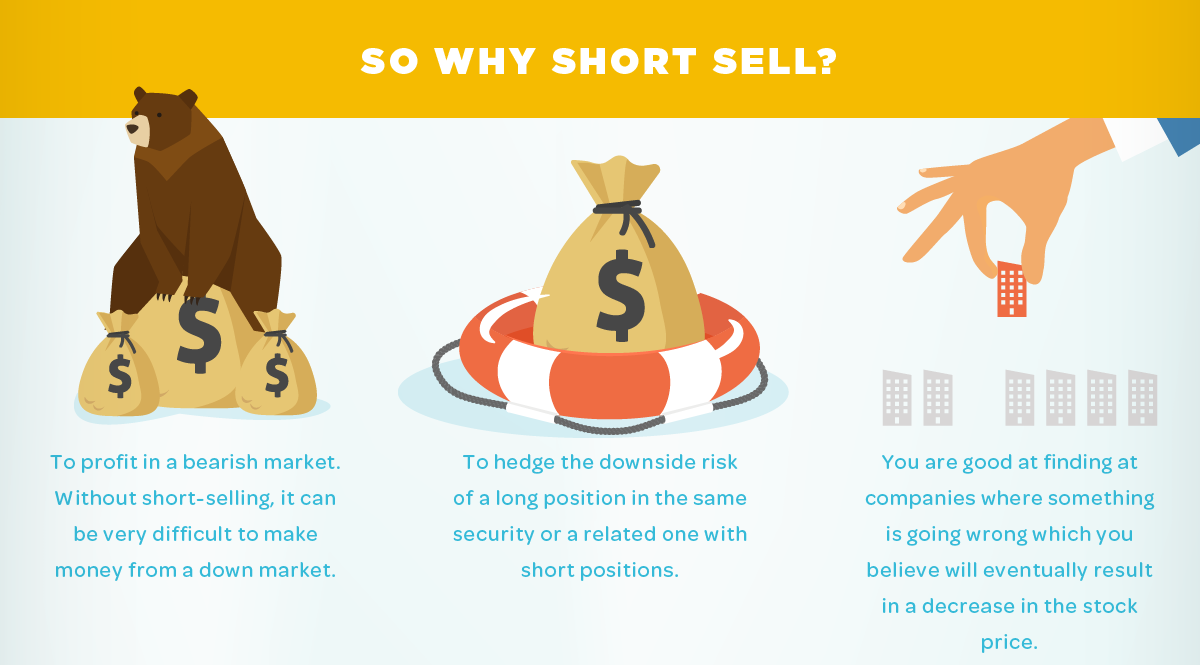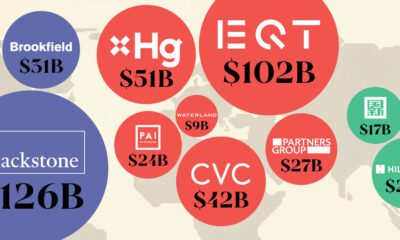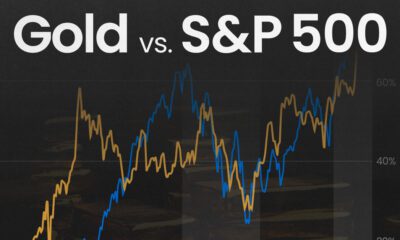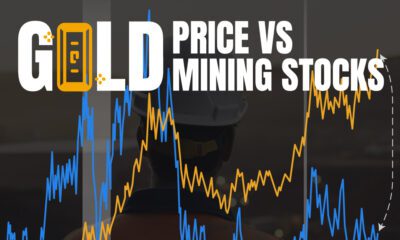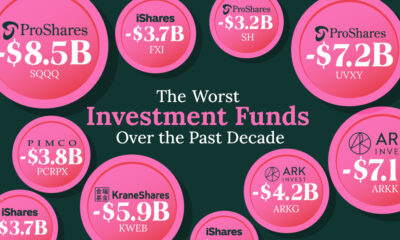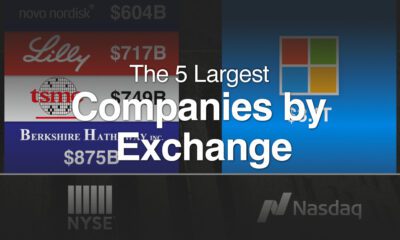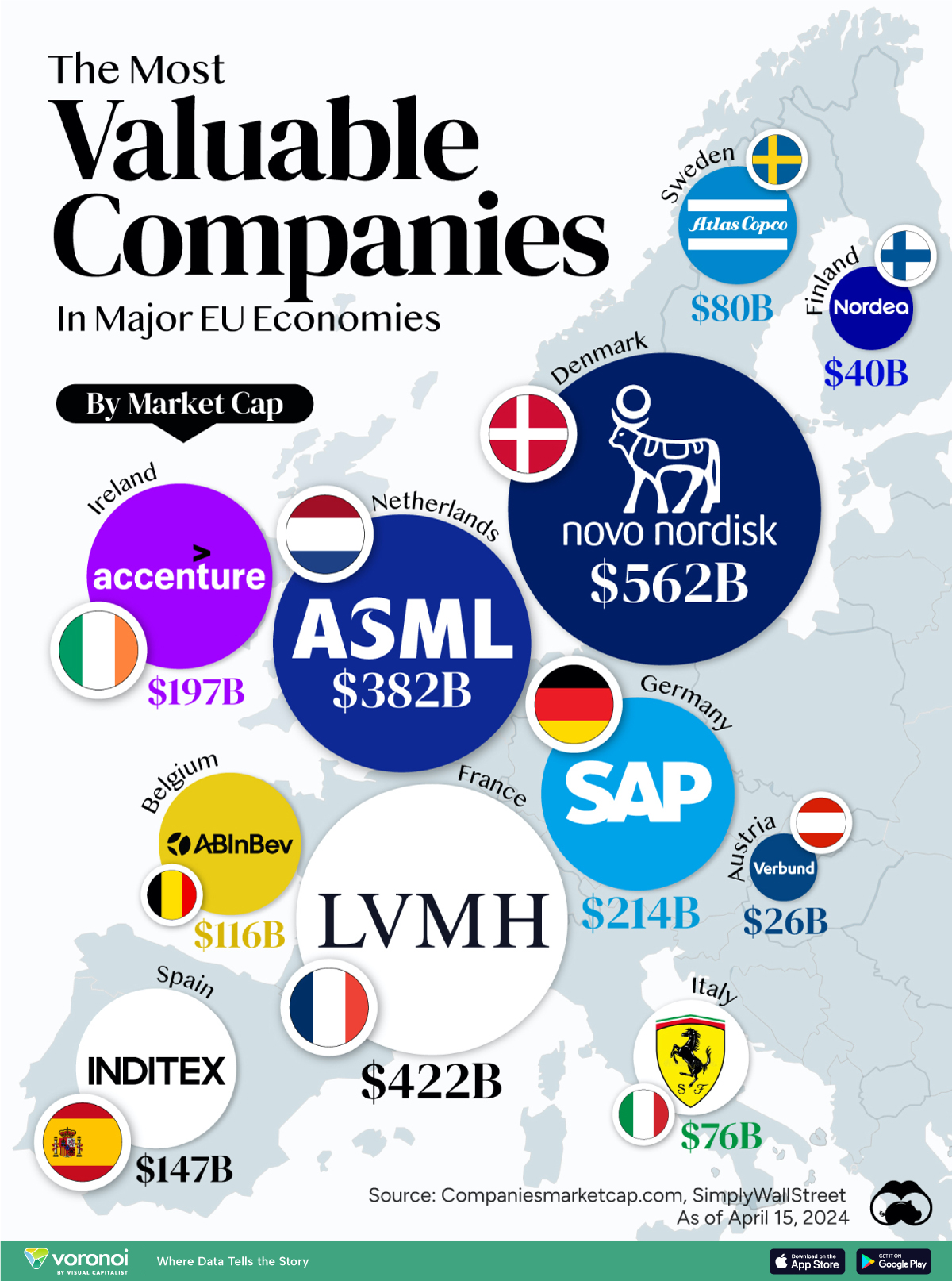Markets
Is Short Selling Stocks Worth It?
For most investors, buying and holding a stock is extremely intuitive.
When you go long, you are betting on that particular company’s success. You are hoping that the market values the stock higher in the future than they do today. Then, when you sell your stake in the company, you’ll realize those gains for a profit.
What is less intuitive is the practice of short selling – or betting against a specific stock or security. While the concept may seem simple at first glance, the actual mechanics behind it are much more complicated for an entry-level investor to understand.
Further, short selling has all kinds of intrinsic risks and costs that need to be understood before it should be used as a tactic. Not grasping these risks can lead to all kinds of horror stories.
Is Short Selling Stocks Worth It?
Today’s infographic comes from StocksToTrade.com, and it addresses the question of whether the risk of short selling is worth the potential payoff.
Our thoughts? Short selling is a tactic used by intermediate to advanced traders, and it should only be attempted by someone who understands the mechanics and risks behind it. Under those circumstances, it can be a useful way to hedge or to profit in a down market.

Is short selling worth it? It likely depends on your level of sophistication and risk tolerance.
The Risks of Short Selling
Here are the specific risks of short selling that every investor should be aware of:
- Losses can keep mounting. The maximum profit you can make is capped at 100% – but if a stock keeps increasing in price, losses can accumulate far beyond that.
- Additional costs. Short selling has a different set of costs than simply buying a stock. These include margin interest, stock borrowing costs, and dividends.
- Short squeezes and other events. Stocks with high demand for shorting can have a “short squeeze” – an event that forces short sellers to close out their short positions. This can add even more upward pressure on the stock.
- Timing is crucial. Over time, generally markets have moved upwards. Even if your short play is a good idea, the market could continue to carry the stock in the interim.
Got a shorting success or horror story? Feel free to share it in the comments below.
Economy
The Most Valuable Companies in Major EU Economies
From semiconductor equipment manufacturers to supercar makers, the EU’s most valuable companies run the gamut of industries.
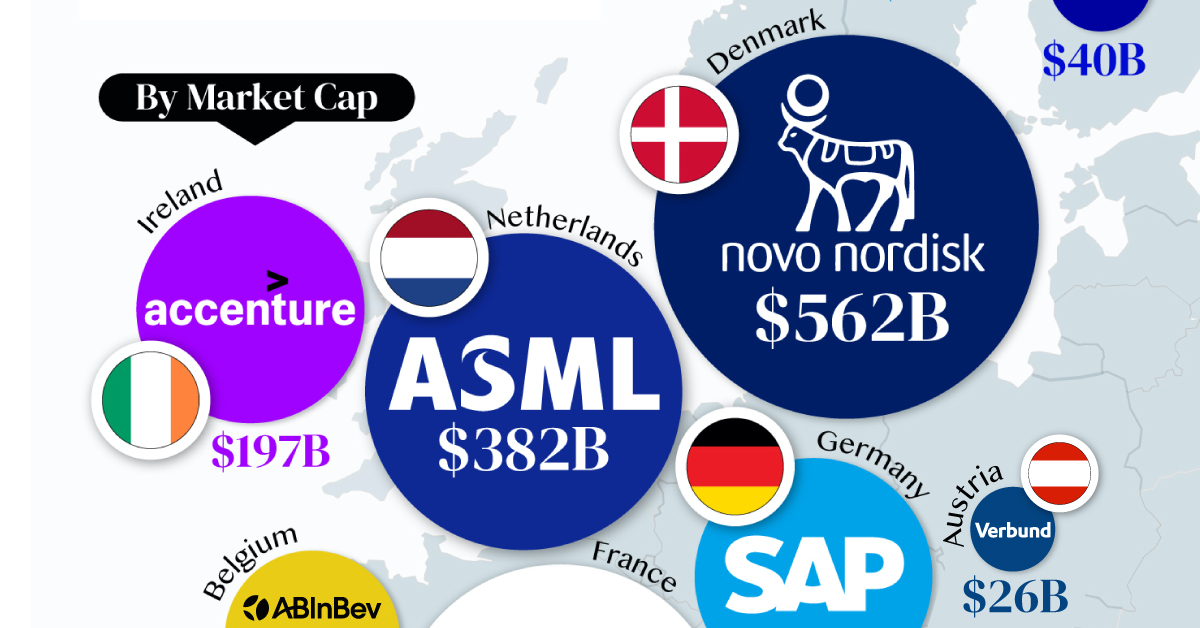
Most Valuable Companies in the EU, by Country
This was originally posted on our Voronoi app. Download the app for free on iOS or Android and discover incredible data-driven charts from a variety of trusted sources.
In this graphic, we mapped out the most valuable corporations in 11 major EU economies, based on their market capitalizations as of April 15th, 2024. All figures are in USD, and were sourced from Companiesmarketcap.com.
Novo Nordisk is currently worth more than $550 billion, making it Europe’s most valuable company by a wide margin. The pharmaceutical giant specializes in diabetes and weight-loss drugs. Demand for two of them, Ozempic and Wegovy, has surged due to their weight-loss capabilities, even causing nationwide shortages in the United States.
The following table includes an expanded list of the most valuable publicly-traded company in larger EU economies. Many of these were not included in the graphic due to space limitations.
| Country | Company | Sector | Market Cap |
|---|---|---|---|
| 🇩🇰 Denmark | 💊 Novo Nordisk | Pharmaceuticals | $562B |
| 🇫🇷 France | 👜 LVMH | Luxury Goods | $422B |
| 🇳🇱 Netherlands | 🔧 ASML | Semiconductor Equipment | $382B |
| 🇩🇪 Germany | 💼 SAP | Enterprise Software | $214B |
| 🇮🇪 Ireland | 🖥️ Accenture | IT Services | $197B |
| 🇪🇸 Spain | 👗 Inditex | Retail | $147B |
| 🇧🇪 Belgium | 🍻 Anheuser-Busch InBev | Beverages | $116B |
| 🇸🇪 Sweden | 🛠️ Atlas Copco | Industrial Equipment | $80B |
| 🇮🇹 Italy | 🏎️ Ferrari | Automotive | $76B |
| 🇫🇮 Finland | 🏦 Nordea Bank | Banking | $40B |
| 🇦🇹 Austria | 🔌 Verbund AG | Energy | $26B |
| 🇱🇺 Luxembourg | 🏗️ Tenaris | Oil & Gas Equipment | $22B |
| 🇨🇿 Czech Republic | 💡 CEZ Group | Energy | $20B |
| 🇵🇱 Poland | ⛽ PKN Orlen | Energy | $20B |
| 🇵🇹 Portugal | 🔌 EDP Group | Energy | $16B |
| 🇬🇷 Greece | 🏦 Eurobank | Banking | $7B |
| 🇭🇺 Hungary | ⛽ MOL Group | Energy | $7B |
| 🇭🇷 Croatia | 🏦 Zagrebacka Banka | Banking | $6B |
| 🇷🇴 Romania | ⛽ Romgaz | Energy | $4B |
| 🇸🇮 Slovenia | 💊 Krka | Pharmaceuticals | $4B |
Note: Figures are rounded and last updated on April 15th, 2024. Countries with top publicly-traded companies worth under $4 billion are excluded.
Luxury supergiant LVMH—which owns brands like Tiffany, Christian Dior, and TAG Heuer to name a few—is Europe’s second largest company by market cap, at $420 billion.
Rounding out the top three is ASML, which produces equipment crucial to chip manufacturers, worth $380 billion.
When looking at the region, there is a vast disparity between EU member states and their most valuable companies.
For example, as mentioned earlier, Denmark’s Novo Nordisk and France’s LVMH are worth between $400-550 billion each. Meanwhile, some countries don’t even have a single publicly-listed company that is worth over $1 billion.
In fact, only 12 EU countries (less than half of the union) are home to the top 100 most valuable companies within the bloc. An additional four countries are represented if you look at the list of the top 200 companies.
-
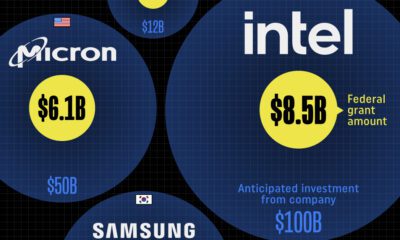
 Technology6 days ago
Technology6 days agoAll of the Grants Given by the U.S. CHIPS Act
-

 Uranium2 weeks ago
Uranium2 weeks agoThe World’s Biggest Nuclear Energy Producers
-
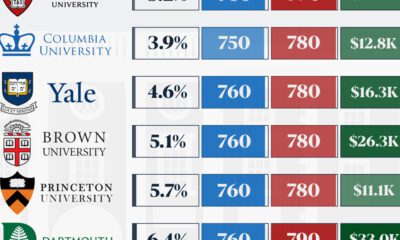
 Education2 weeks ago
Education2 weeks agoHow Hard Is It to Get Into an Ivy League School?
-
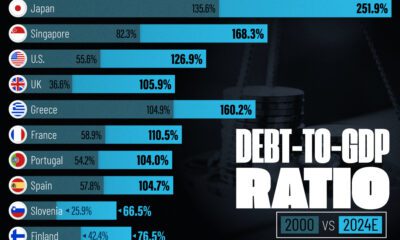
 Debt2 weeks ago
Debt2 weeks agoHow Debt-to-GDP Ratios Have Changed Since 2000
-

 Sports2 weeks ago
Sports2 weeks agoThe Highest Earning Athletes in Seven Professional Sports
-

 Science2 weeks ago
Science2 weeks agoVisualizing the Average Lifespans of Mammals
-

 Brands1 week ago
Brands1 week agoHow Tech Logos Have Evolved Over Time
-

 Energy1 week ago
Energy1 week agoRanked: The Top 10 EV Battery Manufacturers in 2023

